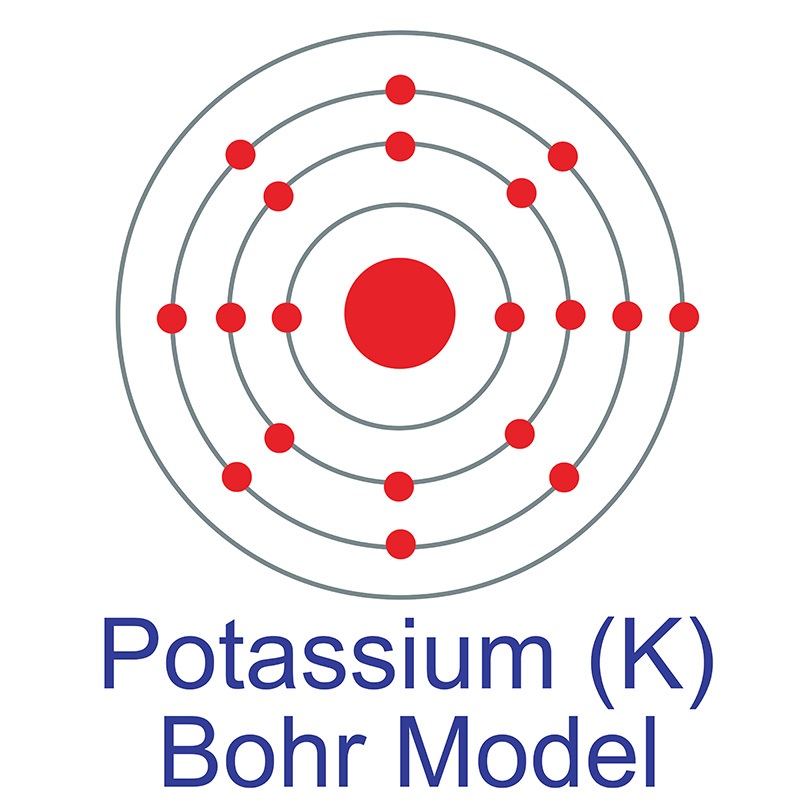 See more Potassium products. Potassium (atomic symbol: K, atomic number: 19) is a Block S, Group 1, Period 4 element with an atomic weight of 39.0983. The number of electrons in each of Potassium's shells is [2, 8, 8, 1] and its electron configuration is [Ar] 4s1. The potassium atom has a radius of 227.2 pm and a Van der Waals radius of 275 pm. Potassium was discovered and first isolated by Sir Humphrey Davy in 1807. Potassium is the seventh most abundant element on earth. It is one of the most reactive and electropositive of all metals and rapidly oxidizes. As with other alkali metals, potassium decomposes in water with the evolution of hydrogen because of its reacts violently with water, it only occurs in nature in ionic salts.
See more Potassium products. Potassium (atomic symbol: K, atomic number: 19) is a Block S, Group 1, Period 4 element with an atomic weight of 39.0983. The number of electrons in each of Potassium's shells is [2, 8, 8, 1] and its electron configuration is [Ar] 4s1. The potassium atom has a radius of 227.2 pm and a Van der Waals radius of 275 pm. Potassium was discovered and first isolated by Sir Humphrey Davy in 1807. Potassium is the seventh most abundant element on earth. It is one of the most reactive and electropositive of all metals and rapidly oxidizes. As with other alkali metals, potassium decomposes in water with the evolution of hydrogen because of its reacts violently with water, it only occurs in nature in ionic salts. In its elemental form, potassium has a silvery gray metallic appearance, but its compounds (such as potassium hydroxide) are more frequently used in industrial and chemical applications. The origin of the element's name comes from the English word 'potash,' meaning pot ashes, and the Arabic word qali, which means alkali. The symbol K originates from the Latin word kalium.
In its elemental form, potassium has a silvery gray metallic appearance, but its compounds (such as potassium hydroxide) are more frequently used in industrial and chemical applications. The origin of the element's name comes from the English word 'potash,' meaning pot ashes, and the Arabic word qali, which means alkali. The symbol K originates from the Latin word kalium.
Materials
Materials by Form
2D Materials Alloy & Alloy Forms Pure Metals & Metal FormsCeramic FibersFoams: Metallic & Ceramic High Purity Materials Isotopes MXenesOxides Rare Earths Semiconductors Solutions
Chemicals & Salts
All Chemicals & Salts Acetates Aluminides Ammonium Sulfates Antimonides Arsenates Benzoate Bromates Bromides Carbonates Chlorides Chromates Fluorides Hydrides Hydroxides Iodates Iodides Lactates Molybdates Nitrates Oxalates Oxides Perchlorates Phosphates Selenates Selenides Selenites Silicates Stearates Sulfates Sulfides Sulfites Tantalates Tellurates Tellurides Tellurites ThiocyanatesVanadates
Ceramics
Nanomaterials
Organometallics
Materials by Application
Additive Manufacturing & 3D Printing Battery & Supercapacitor Materials Catalysts Dental Materials Electronics Materials Fuel Cell Materials Fusion EnergyGlass Manufacturing Green Technology & Alternative Energy Hydrogen Storage Laser Crystals Life Sciences & Biomaterials Metallurgy Nanotechnology & Nanomaterials Optical Materials Photovoltaic & Solar Energy Plating Pigments & Coatings Research & Development Space Technology Sputtering Targets Thin Film Deposition Water Treatment Weather Modification
Life Science Chemicals
Life Science Products AlcoholsAldehydesAmidesAminesAmino Acids & DerivativesAromaticsArylsAzetidinesBenzimidazolesBenzisoxazolesBenzodioxansBenzofuransBenzothiazolesBenzothiophenesBenzoxazolesCarboxylic AcidsEnzymes & InhibitorsEstersEthersFluorinated Building BlocksFuransHalidesImidazolesImidazolidinesIndazolesIndolesIndolinesIsoquinolinesIsoxazolesKetonesMorpholinesNaphthyridinesNitrilesOrganoboronOrganosiliconOxadiazolesOxazolesPharmaceuticals & IntermediatesPhenolsPhytochemicalsPiperazinesPiperidinesPyrazinesPyrazolesPyridazinesPyridinesPyrimidinesPyrrolesPyrrolidinesPyrrolinesQuinazolinesQuinolinesQuinoxalinesSpiroesSulfonyl ChloridesTetrahydroisoquinolinesTetrahydropyransTetrahydroquinolinesTetrazolesThiadiazolesThiazolesThiazolidinesThiolsThiophenesTriazinesTriazoles
About Us
Locations
Austria Belgium Brazil Canada China & Hong Kong Czech Republic Denmark Finland France Germany Greece Hungary India Indonesia Israel Italy Japan Malaysia Mexico Netherlands Norway Philippines Poland Portugal Russia Singapore South Korea Spain Sweden Switzerland Taiwan Thailand Turkey United Kingdom United States
Industries
Aerospace Agriculture Automotive Chemical Manufacturing Defense Dentistry Electronics Energy Storage & Batteries Fine Art Materials Fuel CellsFusion Energy Glass Investment Grade Metals Jewelry & Fashion Lasers Lighting Medical Devices Museums & Galleries Nuclear Energy Oil & Gas Optics Paper & Pulp Pharmaceuticals & Cosmetics Research & Laboratory Robotics Solar Energy Space Sports Equipment Steel & Alloy Producers Textiles & Fabrics Water Treatment Municipalities
Follow Us
 American Elements specializes in producing high purity uniform shaped Potassium Oxide Tablets with the highest possible density and smallest possible average grain sizes for use in Chemical Vapor Deposition (CVD) and Physical Vapor Deposition (PVD) processes including Thermal and Electron Beam (E-Beam) Evaporation, Low Temperature Organic Evaporation, Atomic Layer Deposition (ALD), Metallic-Organic and Chemical Vapor Deposition (MOCVD). Our standard Tablet sizes average in the range of 3 mm, 4 -5 mm, 10 - 50 mm, 1/8" and 1/4". We can also provide Tablets outside this range. We also produce Potassium Oxide as pellets, pieces, powder, and sputtering target. Oxide compounds are not conductive to electricity. However, certain perovskite structured oxides are electronically conductive finding application in the cathode of solid oxide fuel cells and oxygen generation systems. Other shapes are available by request.
American Elements specializes in producing high purity uniform shaped Potassium Oxide Tablets with the highest possible density and smallest possible average grain sizes for use in Chemical Vapor Deposition (CVD) and Physical Vapor Deposition (PVD) processes including Thermal and Electron Beam (E-Beam) Evaporation, Low Temperature Organic Evaporation, Atomic Layer Deposition (ALD), Metallic-Organic and Chemical Vapor Deposition (MOCVD). Our standard Tablet sizes average in the range of 3 mm, 4 -5 mm, 10 - 50 mm, 1/8" and 1/4". We can also provide Tablets outside this range. We also produce Potassium Oxide as pellets, pieces, powder, and sputtering target. Oxide compounds are not conductive to electricity. However, certain perovskite structured oxides are electronically conductive finding application in the cathode of solid oxide fuel cells and oxygen generation systems. Other shapes are available by request.